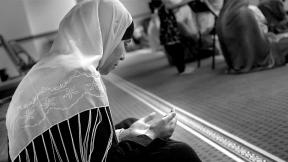
Does your child need a prayer room to perform Zuhr in during lunchtime? Does he need time off for Juma? Or do you want to convince a teacher or principal to give your daughter the day off for Eid-ul-Fitr?
Whatever Islamic obligation you want accommodated at your child's school, it must be done in a methodical, clear and proper manner.
Shabbir Mansuri is founding director of the Council on Islamic Education in Fountain Valley, California.
He provides tips and advice on how to get religious accommodation for your child.
Step #1: Know the laws about religious freedom
Knowing what laws and regulations govern the issue of religious accommodation is crucial before attempting to reach the right authorities. It is also important to understand what is defined as a "reasonable limit" on religious freedom.
See Laws You Need To Know About for the specifics
In the United States, one of the strongest arguments in favor of seeking religious accommodation for your child is former President Bill Clinton's 1995 statement of principles addressing the extent to which religious expression and activity are permitted in public school. This was given to every school district in the US.
Get the help of other officials if necessary to properly understand these laws. A good place to check with is The Freedom Forum First Amendment Center. They have produced a booklet entitled A Parent's Guide to Religion in the Public Schools. You can call them at (615) 321-9588.
Step #2: Get the support of a teacher
"[The first thing I would do is] arm myself with that piece of information and then set up a meeting with the principal of the school along with one of my favorite teachers at the school who will be very supportive, requesting that my son or daughter should be either permitted to [for example] go out to perform Juma prayer at a local Masjid and/or be allowed to perform Juma prayer along with other Muslim students on the school campus," says Mansuri.
Getting the support of a teacher is crucial. It indicates to the principal that the religious accommodation you are seeking will not interfere with your child's performance as a student.
Mansuri says that in most cases, these two steps are all that are needed to get religious accommodation from your child's school.
However, if the principal refuses to grant the accommodation, step three will be necessary.
Step #3: Leave a paper trail, but first, be really nice
"If you find the meeting is not going anywhere then leave a paper trail, meaning, write letters. But before I do that, I would try to do it in a very non-confrontational way by simply sitting down with the principal and a teacher," says Mansuri.
"Try to understand this process where I want to make sure this is not us versus them, but simply the notion of my exercising my constitutional rights in the most respected [way] with compassionate manners, leaving my ?baseball bat'," he explains, referring to an approach that is harsh and confrontational.
Mansuri even suggests inviting the teacher and principal over for dinner as a gesture of goodwill.
Step #4: Writing to the supportive teacher
"My first letter would be to my kid's favorite teacher to ask the person's advice," advises Mansuri. "The letter will be to request to meet with teacher, and it will indicate I want to discuss with you my child's religious needs and I would like to share with you what our president has instructed the teachers and schools to accommodate them."
Following the meeting, a thank you letter to the teacher should be sent. It will also indicate you would like to set up second meeting with the school's principal, and ask the teacher if s/he would be kind enough to go with you to discuss the topics the two of you talked about in your first meeting (see a sample thank you letter to the teacher).
"This will leave two or three letters," notes Mansuri, but in each letter "the tone of my letter should be my bringing the information as politely as I can. (I am trying to) maintain my rights for the schools to accommodate my child's religious needs. So it's a non-threatening letter."
Step #5: Meeting a second time with the principal
Before attending this second meeting with the principal and teacher, "I would also arm myself with the district's education code along with the state educational code as it relates to the topics that I'm going to discuss," says Mansuri.
This can be done by simply calling your district and the state office and asking them to give you the specific educational code that relates to the religious obligation you are seeking accommodation for. That office would fax you the information the same or next day.
Once again, Mansuri stresses that the approach in discussing the matter a second time with the principal should not be confrontational.
"While meeting with the teacher and/or principal, I'm not trying to win an argument by telling them how much I know but rather giving them a very clear understanding that while I understand my rights as a parent, I'm simply there to help them accommodate my child's needs that they are supposed to do anyway," explains Mansuri.
"Make it a win-win situation, not an us versus them situation, and that in itself is the message of Islam."
By this step, Mansuri says your child should have his/her need(s) accommodated.
Step #6: If necessary, repeat these steps with the school district's superintendent
You can repeat the letters and meet with the school district superintendent if the principal still does not accommodate. The superintendent is responsible for all schools in a particular district. Once again, the approach must remain polite and non-confrontational.
Since the president's instructions were issued to districts, it is possible superintendents may be more familiar with them. This should mean your son or daughter will get religious accommodation with no further problems.
Photo Attribution: Petar Milošević - http://commons.wikimedia.org/wiki/File:Writing_a_letter.jpg








Comments
I am a preservice teacher soon to be joining the work force as a social studies teacher. This article brings up a few good points. I do agree that students should be able to continue with religous rituals within a school as long as they are feasable. The school cannot stop students from practicing their religion. The focus of the separation of church and state is that the government (in this case a public school) cannot be the body to put a religious practice in place. Students are not restricted to neglect religious practices while at school. The teachers that are soon to graduate may share the same thoughts as I, when I say tolerance and acceptance should be taught to all. It is a teacher's job to give the students in their classroom the necessary skills to accellerate in the classroom and beyond. All students will come into contact with a person who is different than them. As far as the comment about a religion teaching hate... obviously your ignorance is an attribute that you pride yourself on. The best way to prove a point is to actually be informed about a subject. Not all Islamic people share the few of those that are part of a terrorist group. Just like not all Christians are part of the Nazi Extremist group. This is stereotyping, the very thing that past Americans have fought so hard to shatter.
Location
Sorry this i proof read. I am a Christian that believes in the principles that Jesus Christ lived for and those were of love and tolerance. I am a conservative American and that is why I am tolerant of others and accepting in the God given and constitutional rights of freedom of speech and the right to practice your religious beliefs as long as they do not Harm others. I believe that our forefathers intended the constitutional rights to extend to all Americans regardless of religion, color or gender. I do not believe the constitution is a living document and open for interpretation based on the current times and national state of affairs. Having said that I believe that if a child is so inclined to practice his or her religion then they should be able to just like any other child. Is there a special room set up for all religions? What’s good for one must be good for all. If time for special holidays is needed then you take it without special permission and your child like all others is required to do the work assigned to all children. The problem with this step by step process is that sets a bad example to the rest of the children. Americans we do not need to be threatened by these attempts to practice religion we should all embrace them so that all our children can do the same thing that some minority groups in this country want to do. If they are successful it just clears the path for Christianity to be practiced in the schools again as it was when i went to public school. The lord’s prayer was said by all the kids who wanted to say it. The pledge of allegiance to the Flag of the United States of America was also said by everyone. I believe there a radical Christians, Jews, Muslims, Buddhists and more. The real question is practice your religions but pledge your allegiance to this country which makes it possible to practice your religion without fear!
Location
I am a Christian that believes in the principles that Jesus Christ lived and those were of love and tollerance. I am a conservative American and that is why I am tollerant of others and accepting in the God given and constitutional rights of freedom of speech and the right to practice your religious beliefs as long as they do not Harm others. I believe that our forefathers intened the constitutional rights to extend to all Americans regardless of religion, color or gender. I do not believe the constitution is a living document and open for interpretation based on the current times and national state of affairs. Having said that I believe that if a child is so inclined to practice his or her religion then they should be able to just like any other child. Is there a special room set up for all religions? If time for special holidays is needed then you take it without special permission and your child like all others is required to do the work assigned to all children. The problem with this step by step process is that sets a bad example to the rest of the children. Americans we do not need to be threatened by these attemps to practice religion we should all embrace them so that all our children can do the same thing that some minoity groups in this country want to do. If they are successful it just clears the path for christianity to be practiced in the schools again as it was when i went to public school. The lords prayer was said by all the kids who wanted to say it. The pledge of alligence to the Flag of the United States of America was also said by everyone. I believe there a radical Christians, Jews, Muslims, Buddists and more. The real question is practice your religions but pledge your alligengence to this country which makes it possible to practice your religion without fear!
Location
I wish more parents would get involved like that. Islam is a peaceful religion, and children can show that much better than adults because of their simplicity and earnest way of speaking. As someone who researches things before I spout off about it, I appreciate articles like this one, because it shows how peace, compassion, cooperation, and compromise can make life so much more pleasant than the "baseball bat" technique that so many parents use.
Location
I am assuming this is a joke...the last thing I want my children or grandchildren learning in school is hate, murder, oppression of women, life without human rights...did I mention hate and murder.
Location
If you want your kid to have a day off from school for a holiday, just don't bother sending her off to school that day. You don't have to write letters and invite people to dinner. I don't know who wrote this article, but he/she seems to be unfamiliar with our ways.
Location
Add new comment